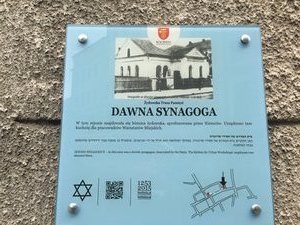Advertisement
Published: September 27th 2016

 Before Annihilation
Before Annihilation
Plaque and Image of the Hasidic Prayer House before the war.Yesterday was the first full day with the group of 40 educators who've taken a week to gather in Kraków. From a 21 year old Austrian young man from the Tyrol to a 65 plus year old Israeli from a kibbutz in northern Israel we are on the same bus this week in order to understand more about the Jews of the territory in southeastern Poland described by the Austro-Hungarian Empire, many Jews from pre-war Poland, and then again the Nazis as Galicia. This was one of the densest heartlands of pulsating Jewish life for more than 500 years. It's where my father's father's family hails, and so it is the landscape that many of my ancestors looked upon.
Yesterday we traveled to Bochnia. A small town of about 12,000 people, including about 2500 Jews in the interwar era, it had once been an important a center of salt mining. Its Jewish community saw the same fate as most of these village towns scattered all over southeastern Poland. As I walked with the group through the town streets and listened to the narrative of life there before and then during its devastating end I tried to imagine a world whose
shape and contours are very far from my own reality and yet to which I am closely tied by the power of memory.
What struck me on this visit and as a whole on the expedition so far is that there are a handful of Poles and other locals from the part of the world who are not Jewish and have no direct ties to Judaism but who have chosen to keep memory and history alive through education. The tour guide in Bochnia has the keys to the Jewish cemetery (one of the best maintained in Poland by a partnership of descendants of Jews from the town and local Poles) so that the story of the Jews from her town, horrible as its end was, will not be erased and effaced from life. Nor is it now only the preserve of Jews, but a shared heritage that can and needs to be struggled with and mourned over by Jews and Poles. The young educators from Slovakia and Lithuania and Latvia who are on this trip with me who are not Jews for the most part have decided that understanding and confronting the past is not a task to be

 unmarked graves
unmarked graves
Unmarked because the names are unknown but the memory of a life lived in this town has been honored by restoration.feared but a process to face. Doing it with educators from around the world is a gift.
Advertisement
Tot: 0.064s; Tpl: 0.01s; cc: 11; qc: 29; dbt: 0.0344s; 1; m:domysql w:travelblog (10.17.0.13); sld: 1;
; mem: 1.1mb

 Before Annihilation
Before Annihilation
 Hasidic Prayer House
Hasidic Prayer House
 unmarked graves
unmarked graves

Robin Bezark
non-member comment
Once again, you capture the mood with your writing. Thanks for letting us take this important journey with you.